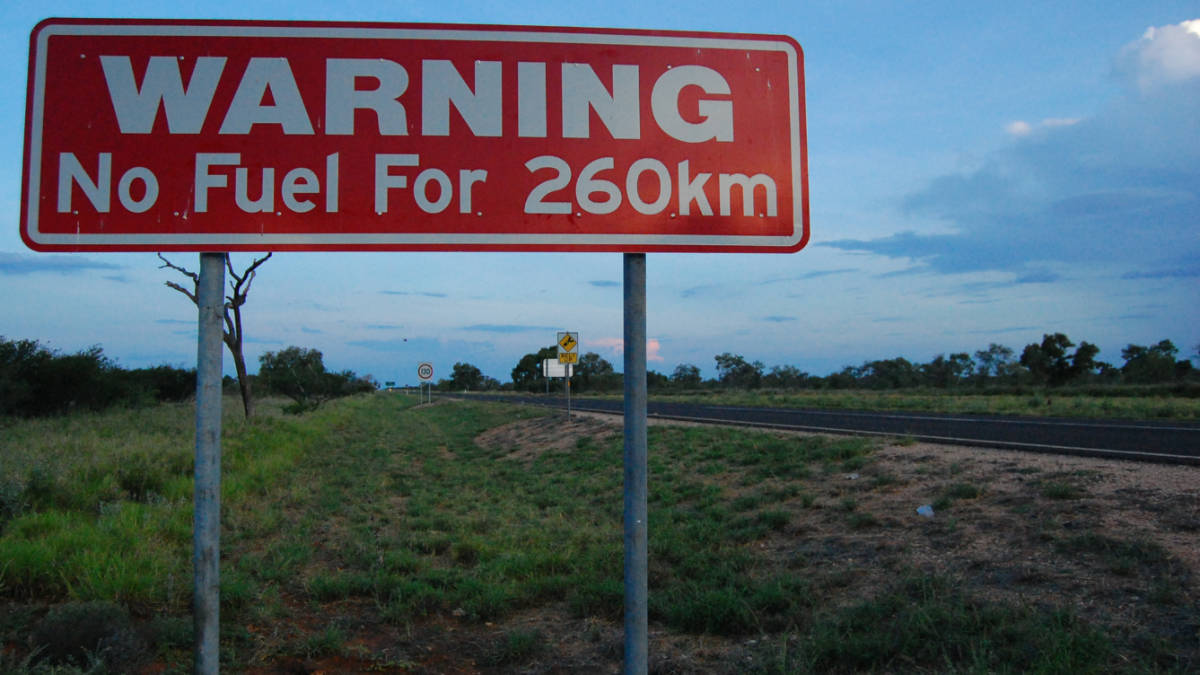Kwinana oil refinery’s approaching closure increases urgency for WA crude producers

Next petrol station warning, outback Australia. Image: Getty
- Crude producers in West Australia look to alternative markets ahead of Kwinana oil refinery’s closure at the end of March
- ‘Oil refining activities at BP’s Kwinana site have now ceased and fuel imports have started’ BP spokesman
- Australia will be down to only two oil refineries, Geelong and Lytton, as Altona and Kwinana convert to import terminals
Several Australian oil producers are looking for alternative off-take markets for their crude production as BP’s Kwinana refinery winds down to its closure at the end of March.
A spokesman for BP told Stockhead the company’s Kwinana refinery will shut down at the end of the month, and the facility has already started to import crude products.
“Oil refining activities at BP’s Kwinana site have now ceased and fuel imports have started,” said the spokesman for BP.
“All processing at the plant is in the shutdown phase which will be completed by the end of March 2021,” he said.
“There will be no impact to the safe and reliable supply of quality fuel products,” the BP spokesman added.
BP announced last October the closure of its Kwinana refinery and its conversion into a terminal for refined crude oil products shipped in from refineries located outside Australia.
The oil company said the “continued growth of large scale, export-orientated refineries throughout Asia and the Middle East has structurally changed the Australian [refining] market.”
In addition, profit margins at Kwinana refinery are no longer high enough to sustain the facility’s operation and the Asia-Pacific oil market is oversupplied with refined products, it said.
“Having explored multiple possibilities for the refinery’s future, BP has concluded that conversion to an import terminal is the best option,” said the oil major.
Triangle Energy’s Kwinana off-take extended to April
Perth basin oil producer Triangle Energy (ASX:TEG) said it will continue to deliver its crude to Kwinana refinery until April 22 as its oil supply agreement with BP has been extended to this date.
Triangle Energy will be able to store its crude oil at the Kwinana site while it negotiates a new off-take agreement after the closure of the BP refinery near Fremantle port.
Another three or four Australian oil companies that refine crude oil at the Kwinana facility are believed to be in a position similar to Triangle Energy in needing new off-take arrangements.
Triangle Energy said Monday it had received from BP a notice of variation of the termination date under its crude oil supply agreement for the Kwinana refinery.
“The termination effective date has therefore been extended from March 22, 2021 to April 22, 2021,” the company said.
The Perth basin oil producer said its Cliff Head oil field will continue to produce and deliver product to the BP Kwinana refinery until April 22.
Triangle Energy said it is considering other opportunities for marketing its oil products and will update the market at an appropriate time.
The company is the operator for the Cliff Head oil field in which it has a 78.75 per cent interest, and it also has a 50 per cent share in the Mt Horner L7 production licence.
Cliff Head produced 242,626 barrels of oil in 2020, down from 290,030 barrels in 2019.
At an average crude oil price of $US41 per barrel in 2020, the company made a loss of $US1.30 per barrel in the 2020 year, according to a company presentation.
ExxonMobil to also close Australian refinery
Another Australian oil refinery operator ExxonMobil announced in February that it planned to follow BP’s lead and convert its Altona refinery into an oil products import terminal.
Altona refinery in Victoria, Australia’s smallest in terms of capacity, is “no longer economically viable” said the company adding its closure decision followed an extensive review.
“The Altona refinery will remain in operation while transition work is undertaken to ensure continued reliable fuel supply for our Mobil customers,” said the oil major.
ExxonMobil did not include a date for the scheduled closure of its Altona refinery in its announcement.
Altona refinery is located 13km west of Melbourne and has operated since 1949 and produces 14.5 million litres of refined products per day, enough for 330,000 cars.
Sixty per cent of Altona’s production is petrol, diesel is 30 per cent, and jet fuel the remaining 10 per cent.
Geelong and Lytton refineries face uncertainty
The closure of Altona and Kwinana oil refineries and their conversion into import terminals for oil products will leave Australia with just two oil refineries.
They are Viva Energy Group’s (ASX:VEA) Geelong refinery in Victoria, and Ampol’s (ASX:ALD) Lytton facility in Brisbane, Queensland.
Together the two remaining oil refineries produce a combined 87,000 barrels per day of diesel, equivalent to just under one-fifth of Australia’s annual sales of 500,000 barrels per day.
Viva Energy stated last October that it continues to evaluate the future viability of its refining business which remains uncertain due to a significant decline in demand for oil products.
Refining margins for the Geelong facility improved to $US5 per barrel in December as the site returned to full production from an average margin of $US3.10 per barrel in FY2020.
The company said in December it plans to develop a LNG regasification terminal at the site of its Geelong refinery as it transforms the facility into a leading energy hub for Victoria.
Viva Energy operates a network of 1,290 fuel stations in Australia, and in February announced it has entered into a strategic alliance with HYZON Motors, a supplier of hydrogen powered commercial vehicles.
Ampol said its Lytton refinery incurred a loss of $145m in 2020 and stated that regional refining margins remain depressed in 2021 on COVID-19 impacted domestic demand.
The company is undertaking a strategic review of Lytton which is set for completion in the June-ended quarter.
Australian imports from China to grow
China appears best placed to fill the gap left by the decline in Australia’s oil refining capacity, instead of Singapore or South Korea, according to Reuters in a report.
“We expect most of the fuel imports to come from Chinese refiners, due to Chinese officials’ continued increase in refined products export quotas and the 600,000 barrels per day expansion to Chinese refinery capacity in 2021,” Rystad Energy energy analyst Julie Torgersud told Reuters.
China’s 1.5 million barrels per day increase in its domestic refining capacity over the next two years, and its expansion of oil products exports is putting further pressure on the already slim profit margins for Asia oil refineries, said energy consultancy Rystad.
A Chinese oil trader told Reuters that China has exported diesel and gasoline products to Australia, and could export more if Australian refinery closures push up refinery margins.
WA will be left without an oil refinery from April, and other states face the same predicament, as a result WA is effectively test-driving the future of post-fossil fuel transportation.
ASX share prices for Ampol (ASX:ALD), Triangle Energy (ASX:TEG), Viva Energy (ASX:VEA)
Related Topics

UNLOCK INSIGHTS
Discover the untold stories of emerging ASX stocks.
Daily news and expert analysis, it's free to subscribe.
By proceeding, you confirm you understand that we handle personal information in accordance with our Privacy Policy.








